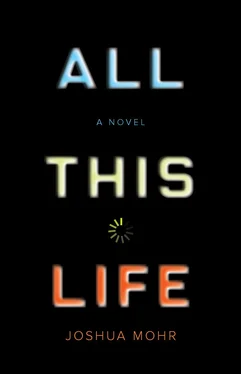The guy flashes that techie smirk again.
“Right now you’re just my friend,” Kathleen says. “Not my sponsor.”
“I’m always your sponsor, sugar. If I wasn’t, I’d be a shitty one.”
Kathleen has a plan to instigate contact with her son again, and it’s a good one. She’d banked on Deb’s eyes and ink and needles, banked on a portrait to show her son, his likeness forever on her flesh. Look , she’ll be able to tell him through the tattoo, I’ve always loved you and I’m sorry and let’s start over.
That’s impossible, she knows. There’s no such thing as starting over. It’s a ruse. Memories are time machines, zooming us through our experiences, and because of this, people are never clean of their yesterdays. There is no transcendence. One minute, we’re forty, then six, and ten, and twenty, and twelve. We remember our shames and humiliations. We remember trauma. Rodney might not recall one thing about Kathleen except that she left. All the good she did throughout the first twelve years of his life might be erased, and if not outright expunged, at least painted over. Covered up. It’s the opposite of Deb tattooing cancer survivors, making the damaged skin into art. Kathleen is a breathing scar, her whole life hardened over by that one mistake.
All of this whizzes through her head as she stands there holding the portrait.
Deb dips the gun into a glass of water, flushing out her needles, then plunges it into an ink cap full of black, goes back to work. “If you mail him a picture of the tattoo, so what?”
“So what?” Kathleen asks.
“Why would that make him feel better?”
“Because it shows I’m thinking about him.”
“The tattoo is for you,” Deb says. “Calling and starting the healing process — that would be for him.”
“I’m finally ready to try and you’re not helping me.”
“You’re making this harder than it has to be,” says Deb. “Call him.”
“I can’t.”
“That brass band that jumped off the Golden Gate?” says Deb. “The one who survived is going to a mental hospital.”
“She needs help.”
“That’s my point,” Deb says. “The doctors can help her. The program has helped you; I’ve tried to help you. But you have to face this fear. You have to face him. I’ll be right with you. We’re all survivors, but even we need help, Kat.” Deb takes her foot off the pedal and her gun goes silent. “How about a compromise? You call him now and I’ll tattoo you after I’m done with this Irish cross.”
“Celtic,” the guy says.
“Now you’re learning,” she says to him.
“That’s bribery,” Kathleen says.
“Only if it works.”
“Fine,” she says to Deb, who gets the phone and asks, “What are you going to say?”
Kathleen dials her old number. If it’s possible to get an adrenaline rush from a phone call, that’s what’s happening. Heart racing and sweating and all her saliva vanishes. And the crazy thing is how good this all feels. How freeing.
“Hello?” a man’s voice says.
“Is Rodney there?”
One thing about mythological punishments: What if you simply stopped rolling that boulder up the hill? Refused to prop it up anymore? Moved out of the way and let it roll down to who knows where, not caring about the consequences?
“Who is this?” says the man’s voice.
“Is this Larry?”
“Nah, this is Felix.”
“Hi, Felix. This is Kathleen. I’d like to talk to my son, please.”
There is a wonderful charge in her, an anticipation, a kinetic thump. Kathleen is about to hear her son’s voice. She’s about to communicate with him. They’re about to talk. To begin, not from scratch but from a place that looks forward, not back. This is the first step toward healing, reconciliation.
“Cunt!” Felix screams.
The miserable syllable shoves through the phone and into her ear, worming around her body and kicking her in the heart.
Then the line goes dead.
That’s all she gets.
And in a way, that’s what she deserves.
She’s earned someone calling “Cunt!”
It’s stitched onto her.
Burned on the skin, its own scar.
Kathleen doesn’t know what to do after hearing that fetid word. She’s standing in the tattoo shop with the phone to her ear and Deb is looking at her and the guy with webbed feet is looking at her and she’s been called that name, the noise of it still clanging, and she hands the phone back to Deb.
“What happened?”
Kathleen utters that wicked word and her sponsor sighs. Even the guy with webbed feet averts his eyes. The whole moment feels like a caricature Kat could draw. She could exaggerate the idiosyncrasies in such a perfect way: It would be easy to turn the guy’s shoes into huge amphibian feet, the size of surfboards, and it would be easy to show Deb with tattoo guns for hands; it would be so easy to show Kathleen, stupid Kathleen, with a phone to her ear, her high hopes being speared by Felix’s dismal syllable. The phone would have fangs. It would bite her ear, chew on her, chew her right up.
“Well, it’s the start,” says Deb. “Congrats on making that first call.”
“I have to go.”
“No. You have to stay.”
Kathleen almost sprints to the front door: “I can’t.”
“Don’t isolate,” Deb says. “Be around people who care about you when—”
But she can’t hear the end of the sentence. She can’t hear anything except Felix’s syllable, over and over, and she’s off, not running, but not walking, somewhere between these two, as though she can’t out-hustle the syllable, leave it at the shop. And there’s still the various clogs of yuppies out front of three-star restaurants, still the mothers ambushing her with their babies and toddlers, and Kathleen sees the gypsy with her sign, its perfect font, KNOW YOUR FUTURE.
Kathleen already does.
Her future is in a bar.
Her immediate future starts right this second in a bar. Yes. Starts with pushing past the smoking hipsters out front and opening the door and bellying up and looking around at all the bottles and beer taps and hearing Jack White singing about a girl who had no faith in medicine. It starts with someone saying, “What would you like?” and this somebody happens to be the bartender, and she happens to be talking to Kathleen, who happens to answer with this: “Bourbon.”
The bartender is young and Asian, and Kat pines for the simplicities of youth, yearns for an existence that hasn’t marred so much that forgiving yourself is impossible.
“Any preference?” says the bartender.
“I don’t care.”
“We got Old Crow in the well.”
“Fine.”
Kathleen meant what she said before, about starting over being impossible. She cannot have this one drink without reliving all the ones she already had, without tasting every spirit that ever traveled down her throat, experiencing the aftershocks of every hangover, the shame she already feels and the bourbon hasn’t hit her lips yet. She knows she shouldn’t do this, knows that this won’t solve anything, not really, but who said she was interested in a solution? Who said this was an exercise in making things better? No, this isn’t about improvement. It’s not about making things worse, either. It’s just about this one moment and she wants a drink. She hasn’t been rewarded for all her sober days; in fact, her life’s been harder living clean, all that pure access to her mistakes. Her whole prison break fantasy is phony and faraway and pointless, and her palms are on that boulder again, the calluses ready for another shove. She feels that greedy eagle land on her stomach, ready to feast on her liver for the umpteenth time, appetite never tiring of the same square meal.
Читать дальше












